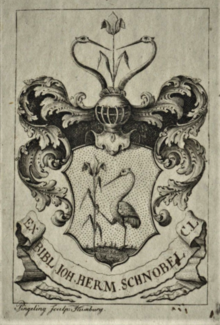Johann Hermann Schnobel
Johann Hermann Schnobel (born October 18, 1727 in Lübeck ; † December 23, 1802 there ) was a German cantor and historian.
Life
Schnobel was a son of the pastor of the Petrikirche in Lübeck Joachim Johannes Schnobel and his wife Magdalena Katharina, nee. Küsterbeck. The main pastor Friedrich Joachim Schnobel was his older brother. After studying theology, he was appointed cantor and music director in 1756 to succeed Caspar Ruetz . His office included the maintenance of choral music with the student choir of the Katharineum at St. Marien and quarterly also in the other main churches, while figural music and evening music were reserved for the organist. At the same time he was a teacher at the Katharineum. With the school choir, he was also responsible for accompanying funerals. The quality and reputation of choral music had suffered even more since Ruetz, who had campaigned in a series of pamphlets from 1750 to 1753 for better equipment for church music, especially since the number of pupils in the Katharineum had also hit a low point. During the school reform under the direction of Rector Friedrich Daniel Behn , which was shaped by the Enlightenment , the cantorate was abolished on October 1, 1801 when Schnobel retired. This ended the obligation of students to perform liturgical singing in Lübeck's main churches , which had existed since the Bugenhagen church ordinance of 1531.

In addition to his work as a cantor, and with the decline of this part of his profession, Schnobel devoted himself to local historical studies. One of his most important works is the publication of the third edition of Jacob von Melle's Thorough Message . In 1768, after approval by the Syndicus Carl Henrich Dreyer, he was commissioned by the city council to maintain the genealogical register. His works, handed down in the archive of the Hanseatic City of Lübeck, are important sources to this day.
His family book is preserved in the Lübeck city library , as has the Lubecensien collection of his library since 1851.
Works
- Jacob von Melles Thorough message from the Kayserlichen, Freyen and the H. Römis. Imperial City of Lübeck 3rd edition 1787
- Digitized copy of the copy from the Bavarian State Library
- Lübeckisches Münz- und Medaillenkabinet, collected by Ludolph Heinrich Müller, with explanatory notes and a preceding coin history. Lübeck: CG Donatius 1790
literature
- Georg Christoph Hamberger / Johann Georg Meusel : The learned Teutschland or lexicon of the now living German writers. Volume 7, Lemgo: Mayersche Buchhandlung 1798 5 , p. 266
- Alfred Hegge: The Lübeck Cantorat at the Katharineum 1531-1801. In: Festschrift for the 475th anniversary of the Katharineum in Lübeck. Lübeck 2006, pp. 31–39 (general information on the cantorat in Lübeck)
- Wilhelm steel: music history of Lübeck. Volume II: Sacred Music. Kassel and Basel: Bärenreiter 1952, p. 97
Individual evidence
- ^ Genealogical register (PDF; 54 kB), archive of the Hanseatic City of Lübeck
- ↑ RAA
| personal data | |
|---|---|
| SURNAME | Schnobel, Johann Hermann |
| BRIEF DESCRIPTION | German cantor and historian |
| DATE OF BIRTH | October 18, 1727 |
| PLACE OF BIRTH | Lübeck |
| DATE OF DEATH | December 23, 1802 |
| Place of death | Lübeck |